

Plural of Hypothesis
What is the plural of hypothesis.
The Quick Answer
Are You Good at Plurals?
The standard rules for forming the plurals, why is there confusion over the plural of hypothesis.

This page was written by Craig Shrives .
You might also like...
Help us improve....

Was something wrong with this page?

Use #gm to find us quicker .

Create a QR code for this, or any, page.
mailing list
grammar forum
teachers' zone
Confirmatory test.
expand to full page
show as slides
download as .doc
print as handout
send as homework
display QR code
- More from M-W
- To save this word, you'll need to log in. Log In
Definition of hypothesis
Did you know.
The Difference Between Hypothesis and Theory
A hypothesis is an assumption, an idea that is proposed for the sake of argument so that it can be tested to see if it might be true.
In the scientific method, the hypothesis is constructed before any applicable research has been done, apart from a basic background review. You ask a question, read up on what has been studied before, and then form a hypothesis.
A hypothesis is usually tentative; it's an assumption or suggestion made strictly for the objective of being tested.
A theory , in contrast, is a principle that has been formed as an attempt to explain things that have already been substantiated by data. It is used in the names of a number of principles accepted in the scientific community, such as the Big Bang Theory . Because of the rigors of experimentation and control, it is understood to be more likely to be true than a hypothesis is.
In non-scientific use, however, hypothesis and theory are often used interchangeably to mean simply an idea, speculation, or hunch, with theory being the more common choice.
Since this casual use does away with the distinctions upheld by the scientific community, hypothesis and theory are prone to being wrongly interpreted even when they are encountered in scientific contexts—or at least, contexts that allude to scientific study without making the critical distinction that scientists employ when weighing hypotheses and theories.
The most common occurrence is when theory is interpreted—and sometimes even gleefully seized upon—to mean something having less truth value than other scientific principles. (The word law applies to principles so firmly established that they are almost never questioned, such as the law of gravity.)
This mistake is one of projection: since we use theory in general to mean something lightly speculated, then it's implied that scientists must be talking about the same level of uncertainty when they use theory to refer to their well-tested and reasoned principles.
The distinction has come to the forefront particularly on occasions when the content of science curricula in schools has been challenged—notably, when a school board in Georgia put stickers on textbooks stating that evolution was "a theory, not a fact, regarding the origin of living things." As Kenneth R. Miller, a cell biologist at Brown University, has said , a theory "doesn’t mean a hunch or a guess. A theory is a system of explanations that ties together a whole bunch of facts. It not only explains those facts, but predicts what you ought to find from other observations and experiments.”
While theories are never completely infallible, they form the basis of scientific reasoning because, as Miller said "to the best of our ability, we’ve tested them, and they’ve held up."
- proposition
- supposition
hypothesis , theory , law mean a formula derived by inference from scientific data that explains a principle operating in nature.
hypothesis implies insufficient evidence to provide more than a tentative explanation.
theory implies a greater range of evidence and greater likelihood of truth.
law implies a statement of order and relation in nature that has been found to be invariable under the same conditions.
Examples of hypothesis in a Sentence
Word history.
Greek, from hypotithenai to put under, suppose, from hypo- + tithenai to put — more at do
1846, in the meaning defined at sense 2
Phrases Containing hypothesis
- counter - hypothesis
- nebular hypothesis
- null hypothesis
- planetesimal hypothesis
- Whorfian hypothesis
Articles Related to hypothesis

This is the Difference Between a...
This is the Difference Between a Hypothesis and a Theory
In scientific reasoning, they're two completely different things
Dictionary Entries Near hypothesis
hypothermia
hypothesize
Cite this Entry
“Hypothesis.” Merriam-Webster.com Dictionary , Merriam-Webster, https://www.merriam-webster.com/dictionary/hypothesis. Accessed 21 Nov. 2024.
Kids Definition
Kids definition of hypothesis, medical definition, medical definition of hypothesis, more from merriam-webster on hypothesis.
Nglish: Translation of hypothesis for Spanish Speakers
Britannica English: Translation of hypothesis for Arabic Speakers
Britannica.com: Encyclopedia article about hypothesis
Subscribe to America's largest dictionary and get thousands more definitions and advanced search—ad free!

Can you solve 4 words at once?
Word of the day.
See Definitions and Examples »
Get Word of the Day daily email!
Popular in Grammar & Usage
How to use em dashes (—), en dashes (–) , and hyphens (-), plural and possessive names: a guide, the difference between 'i.e.' and 'e.g.', why is '-ed' sometimes pronounced at the end of a word, what's the difference between 'fascism' and 'socialism', popular in wordplay, 8 words with fascinating histories, 8 words for lesser-known musical instruments, birds say the darndest things, 10 words from taylor swift songs (merriam's version), 10 scrabble words without any vowels, games & quizzes.

bottom_desktop desktop:[300x250]
- Cambridge Dictionary +Plus
Meaning of hypotheses in English
Examples of hypotheses.

Word of the Day
Alice-in-Wonderland
Your browser doesn't support HTML5 audio
strange, like something in a dream or an imaginary world, especially in a way that is not based on practical, reasonable ideas

Cambridge Dictionary’s Word of the Year 2024

Learn more with +Plus
- Recent and Recommended {{#preferredDictionaries}} {{name}} {{/preferredDictionaries}}
- Definitions Clear explanations of natural written and spoken English English Learner’s Dictionary Essential British English Essential American English
- Grammar and thesaurus Usage explanations of natural written and spoken English Grammar Thesaurus
- Pronunciation British and American pronunciations with audio English Pronunciation
- English–Chinese (Simplified) Chinese (Simplified)–English
- English–Chinese (Traditional) Chinese (Traditional)–English
- English–Dutch Dutch–English
- English–French French–English
- English–German German–English
- English–Indonesian Indonesian–English
- English–Italian Italian–English
- English–Japanese Japanese–English
- English–Norwegian Norwegian–English
- English–Polish Polish–English
- English–Portuguese Portuguese–English
- English–Spanish Spanish–English
- English–Swedish Swedish–English
- Dictionary +Plus Word Lists
- All translations
To add hypotheses to a word list please sign up or log in.
Add hypotheses to one of your lists below, or create a new one.
{{message}}
Something went wrong.
There was a problem sending your report.

The Plural of Hypothesis: Here’s What It Is and How to Use It

Ever get stuck wondering what the plural form of hypothesis is in English? Perfect! This article will tell you just that plus give more facts about the word hypothesis, synonyms like a thesaurus, examples, and the history of the word. You will no doubt be an expert on all things surrounding the word hypothesis by the end of this article.
Your writing, at its best
Compose bold, clear, mistake-free, writing with Grammarly's AI-powered writing assistant
What Is The Definition Of Hypothesis
As found in the Meriam Webster Dictionary
- An assumption or concession made for the sake of argument
- an interpretation of a practical situation or condition taken as the ground for action
- a tentative assumption made in order to draw out and test its logical or empirical consequences
- the antecedent clause of a conditional statement
As found in the Cambridge Dictionary
- an idea or explanation for something that is based on known facts but has not yet been proved: several hypotheses for global warming have been suggested.
In “The Origin of Hypothesis” it is phrased as a ‘scientific guess’. In the context of science, a hypothesis is a placeholder for a theory until it is proven by science to be accurate.
A scientific hypothesis sed to explain something occurring in our universe that currently does not fit into our current available scientific theories. Scientific hypotheses also include null hypothesis, working hypothesis, and alternative hypothesis.

History and Origin of The Word
From the Greek hypotithenai to put under, suppose, from hypo- + tithenai to put. The first use of the word hypothesis can be traced back to 1596. Issac Newton actually rejected the hypothesis, he said “Hypotheses non fingo” which translates to “I Frame no hypotheses”. This was back in 1721 in Issac Newton’s book “Opticks, or A Treatise of the Reflections, Refractions, Inflections, and Colours of Light”
What Is More Than One Hypothesis Called?
The plural form of the hypothesis is hypotheses. This is the only way in the English language to make hypothesis plural. Because of the Greek origin, the rule of making a noun that ends in “is” to change it to “es.”
- Assumption – Something taken for granted
- Postulate- suggest or assume the existence, fact, or truth of (something) as a basis for reasoning, discussion, or belief
- Rationale – Logic for belief, action
- Previous observations- things that were seen or experienced in the past
- Supposition – guess, belief
- Theorem – explanation based on hypothesis and experiments done by experimenters using the scientific method
- Thesis – belief, assumption to be tested
- Conjecture – speculation, assumption
- Conclusion – end
- Tentative Explanation – clarification; reason
- Guess – belief, speculation
- Interpretation – understanding
- Premise – hypothesis, argument
What Is The Difference Between Hypothesis and Theory?
Since we now know that a hypothesis is a guess or assumption, how is that different from a theory? The definition of a theory is “a supposition or system of ideas intended to explain something, especially one based on general principles independent of the thing to be explained”.
Although we might think of a theory as something that has not been 100% proven, its definition in the application of science is something that has been tested as an explanation for things occurring. It is still an explanation that is thought of as true until proven otherwise, the difference here is that a hypothesis is thought to explain something not yet tested and could also be thought of as an unproved theory or suggested explanation.
Follow these examples to see the difference in action:
- Fact: “The clouds are dark outside.”
- Hypothesis: “It might storm today.”
- Theory: “Rain clouds are dark because of their particulate density. The denser the water droplets are in the cloud the more light will be scattered, which will lead to a darker appearance.”
- Fact: “Light roast coffee has more caffeine than dark roast coffee”
- Hypothesis: “I should drink a cup of light roast coffee if I want more caffeine”
- Theory: “During the roasting process caffeine is slowly burned off, therefore it is true that light roast coffee has more caffeine. You should however choose dark roast if you want more caffeine per cup because although per bean light roast has more caffeine, per gram of coffee dark roast contains more caffeine. This is because you have to consider the percent of weight loss that occurs with roasting a coffee to a dark level, which is higher than the percent of caffeine lost, therefore you have more caffeine per gram in dark roast over light roast, only by a minuscule amount.”
What Is The Difference Between An Idea and Hypothesis?
Since a hypothesis is an idea that can be tested, here are some examples of what is just an idea and can’t be tested followed by a similar idea that can be tested and is a hypothesis.
- Idea: Biden would be a better president vs Trump – Can not be tested since we have no data.
- Hypothesis: Obama did a better job at fixing unemployment vs Bush – can be tested by looking at the data.
- Idea: I could have been the best disc golfer if I started playing when I was a kid – Impossible to test
- Hypothesis: Paul McBeth probably hit more circle 2 putts on tour last year than Ricky Wysocki. – Can be proven by looking at the data for all their putts on the PDGA tour last year.
Example Sentences In Context
The following are examples of hypothesis in context:
“We came up with the assumptions and then narrowed them down to one hypothesis for each category.” – Forbes
“The notion of hypothesis testing has recently invaded the practice of entrepreneurship as a tool to construct of new ventures” – Forbes
“There’s not one unifying hypothesis as to why, but there’s probably five to 20 different things that have contributed to it.” – USA Today
“Most thinkers or hypothesists of any degree of sobriety allow, that an hypothesis…is not to be received as probably true because it accounts for all the known phenomena since this is a condition sometimes fulfilled tolerably well by two conflicting hypotheses…while there are probably a thousand more which are equally possible, but which, for want of anything analogous in our experience, our minds are unfitted to conceive” – Underdetermination of Scientific Theory
“The expensive tissue hypothesis was focused on human brains and it was never intended as a one-size-fits-all possible explanation that applied across all mammals. The original paper even said that “the cost of the additional brain tissue could have been met by strategies other than a reduction in gut size.” – National Geographic
Kevin Miller is a growth marketer with an extensive background in Search Engine Optimization, paid acquisition and email marketing. He is also an online editor and writer based out of Los Angeles, CA. He studied at Georgetown University, worked at Google and became infatuated with English Grammar and for years has been diving into the language, demystifying the do's and don'ts for all who share the same passion! He can be found online here.
Recent Posts

The Plural of Software: Here’s What It Is and How to Use It

The Plural of Mouse: Here’s What It Is and How to Use It

The Plural of Hoof: Here’s What It Is and How to Use It
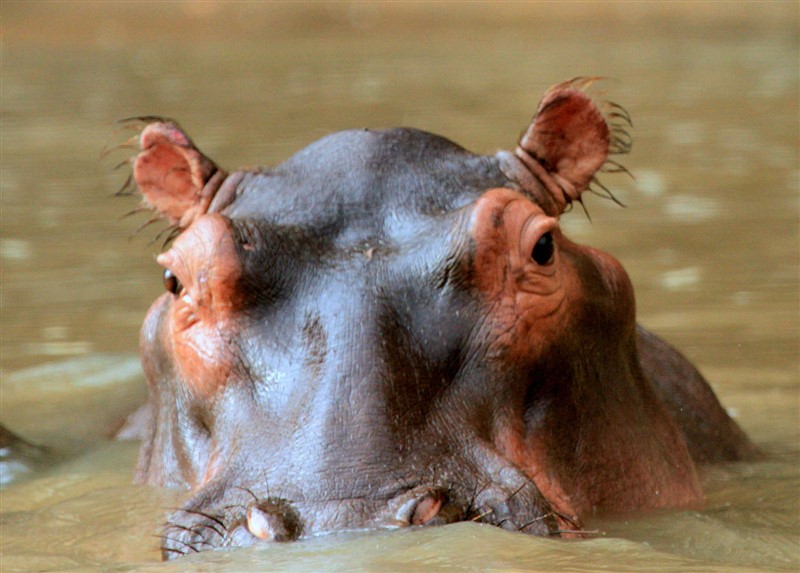

The Plural of Hippopotamus: Here’s What It Is and How to Use It

Hypothesis vs. Hypotheses — What's the Difference?
Difference Between Hypothesis and Hypotheses
Table of contents, key differences, comparison chart, formulation, scientific research, compare with definitions, common curiosities, what are hypotheses, how is a hypothesis tested, how do hypotheses contribute to scientific knowledge, what happens if a hypothesis is refuted, why are multiple hypotheses important in research, what is a hypothesis, can a hypothesis be proven, do all scientific studies test a hypothesis, can there be more than one hypothesis in a study, how are hypotheses formulated, how are hypotheses evaluated, what distinguishes a hypothesis from a theory, is it necessary to have a hypothesis before conducting an experiment, can a hypothesis be changed, what role do hypotheses play in the scientific method, share your discovery.

Author Spotlight
Popular Comparisons

Trending Comparisons

New Comparisons

Trending Terms

"What's the plural of hypothesis?"
The plural of hypothesis is hypotheses .
Definition of hypothesis:
A supposition or assumption based on limited evidence which has yet to be proven or disproven.
Is 'Hypothesis' Plural or Singular?
The plural form of "hypothesis" is "hypotheses." This is because "hypothesis" is a Greek-derived word that follows the rules for forming plurals of Greek-derived words.
In general, Greek-derived words that end in "-is" form the plural by changing the ending to "-es."
The plural of "hypothesis" is "hypotheses" because it is a borrowed word from the Greek language, and it follows the rules of Greek grammar for forming the plural.
In Greek, the plural of "hupothesis," the Greek word from which "hypothesis" is derived, is "hupotheses."
Other examples of Greek-derived words that follow this pattern include "analysis" (singular) and "analyses" (plural), "crisis" (singular) and "crises" (plural), and "thesis" (singular) and "theses" (plural).
The word "hypothesis" comes from the Greek word "hypothesis," which means "base," "foundation," or "assumption."
In scientific contexts, hypotheses are educated guesses or proposed explanations for a phenomenon that is based on limited evidence and is used as a starting point for further investigation.
Plural of Hypothesis Example Sentences
Here are some examples to illustrate the difference between the singular and plural forms of the word "hypothesis":
Singular: " A hypothesis has been proposed to explain the sudden increase in the number of earthquakes in the region" .
Plural: " Two hypotheses have been proposed to explain the sudden increase in the number of earthquakes in the region. One suggests that the earthquakes are caused by tectonic activity, while the other suggests that they are caused by the injection of wastewater into the ground" .
Singular: " The hypothesis that the Earth is flat has been debunked by scientific evidence" .
Plural: " There are many hypotheses about the origins of the universe, but the most widely accepted one is the Big Bang theory" .
Throughout history multiple hypotheses were put forward to explain why objects tended to fall to Earth when dropped. The Greeks believed it was because the Earth was the center of the Universe.
https://www.merriam-webster.com/dictionary/hypothesis
Similar Questions
What's the plural of...

Advertisement
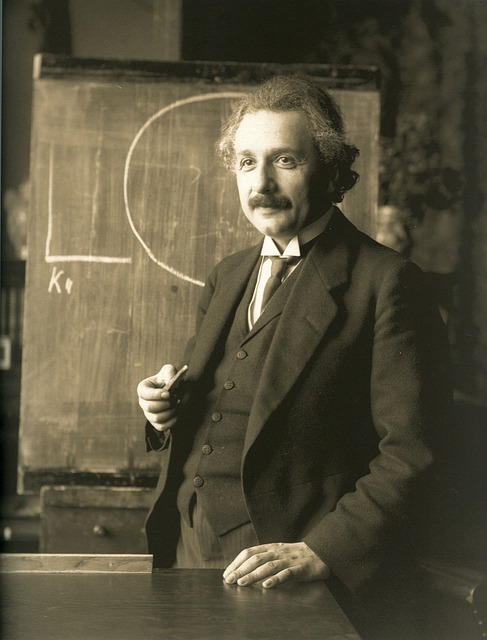

English Teacher Site
Whats the Plural of Hypothesis: Understanding Grammatical Number
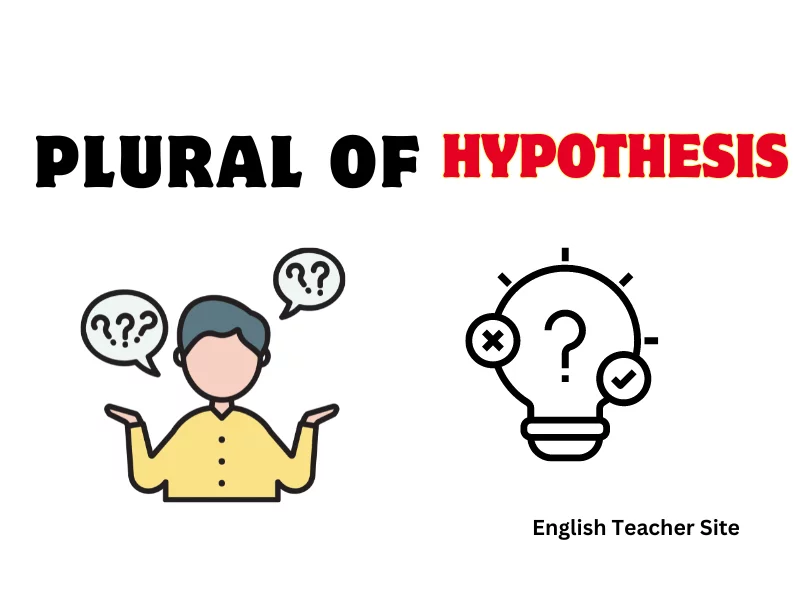
- The word “hypotheses” is the plural form of “hypothesis.”
- “Hypothesis” and “hypotheses” are used to propose explanations for phenomena, with usage depending on the number.
- The origin of “hypothesis” traces back to Greek, affecting its pluralization in English.
In the most straightforward terms, the plural of “hypothesis” is “hypotheses.” This transformation follows a specific pattern seen in words that end in “-is,” with the “-is” changing to “-es” to form the plural. Understanding the correct use of the singular and plural forms is fundamental for both written and spoken English, especially within academic and scientific contexts where the word is frequently employed.
Table of Contents
What’s the Plural of “Hypothesis”?
Singular to Plural Transformation
The transformation from singular to plural for the word “hypothesis” involves altering the ending of the word:
- Change the “is” to “es”
- This results in the plural form “hypotheses”
Pronunciation
The plural form is pronounced as “hī-ˈpä-thə-ˌsēz.” It’s essential to note that the difference is not just in spelling but also in pronunciation.
Usage of Hypothesis and Hypotheses
Here is a simple breakdown of when to use each form:
Examples in Sentences
- Singular : The scientist tested the hypothesis to see if it was valid.
- Plural : After many experiments, all the hypotheses were evaluated for accuracy.
What’s the Singular of Hypothesis?
The singular form of hypothesis is “hypothesis.” To assist in understanding, consider the following tables:
Another table illustrating the usage in a sentence:
Here are key points to remember about the term “hypothesis”:
- It is the singular form used when referring to one proposed explanation.
- A hypothesis can later become a theory if it is supported by substantial evidence.
- In the realm of science, it is a statement subject to verification or falsification through research.
Defining the Word “Hypothesis”
The term hypothesis originates from the Greek word meaning base or foundation . It is commonly understood as a starting point for scientific inquiry, a proposed explanation made on the basis of limited evidence as a starting point for further investigation. In its essence, a hypothesis is a tentative assumption designed to test its logical or empirical consequences.
In scientific reasoning, a hypothesis serves as a provisional idea whose merit requires evaluation. It is not just a wild guess, but an informed conjecture that sets the stage for experimentation and observation.
Key Attributes of a Hypothesis:
- Conjectural : A hypothesis is an educated guess about the relationship between two or more variables.
- Testable : It must be possible to prove that the hypothesis is true or false through evidence.
- Predictive : A hypothesis should make predictions that can be verified through testing.
- Falsifiable : To be scientific, a hypothesis must be structured in a way that it can be refuted by evidence.
Hypothesis in Conditional Statements:
For example, in the statement “If molecules are exposed to higher temperatures, then their kinetic energy will increase,” the hypothesis is that higher temperatures affect molecular kinetic energy.
Hypothesis (Singular) Used in Sentences
Examples in Sentences:
- The scientist formulated a hypothesis about the effect of light on plant growth.
- After analyzing the data, she presented her hypothesis concerning the animals’ migration patterns.
- His hypothesis that increased sunlight would enhance energy efficiency remains to be tested.
- In her thesis, the hypothesis revolved around the impact of social media on communication skills.
- It is key for a hypothesis to be clear and concise for it to lead to meaningful scientific investigation.
Regarding the use of “hypothesis” in academic writing, it is important to:
- Identify the key variable : Highlight what the hypothesis is specifically attempting to test or predict.
- State the expected outcome : Clarify the predicted result or effect that the hypothesis addresses.
Tips for crafting a hypothesis :
- Keep it simple and testable.
- Ensure it is backed by existing literature and theories when applicable.
- Tailor it to be specific , addressing a particular phenomenon or set of data.
- A hypothesis must be falsifiable ; that is, it must be phrased in a way that makes it possible to reject if it is not true.
- Avoid complex jargon when constructing a hypothesis; clarity ensures that others can understand and test it.
- Remember, a hypothesis is not a question, but rather a statement that reflects what the researcher believes to be true.
Hypotheses (Plural) Used in Sentences
In the realm of research, it’s common to encounter:
Example Sentences:
- The scientists reviewed several competing hypotheses before commencing their experiment.
- Their hypotheses centered on the potential effects of climate change on marine biodiversity.
- During the symposium, the researcher explained her methods for testing the various hypotheses .
Using “hypotheses” precisely:
- Clarity : Each of the hypotheses represented a possible explanation for the phenomenon observed.
- Context : In scientific discussions, it’s paramount to present hypotheses in a structured manner.
- Comparison : The study contrasted traditional hypotheses with innovative conjectures emerging in the field.
In day-to-day language or teaching scenarios, one might encounter scenarios such as:
- The teacher asked the students to write down their own hypotheses about the outcome of the chemical reaction.
- The book included several interesting hypotheses about the origins of language.
Origin of the Word “Hypothesis”
Ancient Greek is the initial source of the word “hypothesis.” Specifically, it derives from two Greek words: “ὑπό” meaning ‘under,’ and “θέσις” meaning ‘a placing’ or ‘proposition.’ The combination of these elements resulted in “ὑπόθεσις” (hypothesis), signifying ‘a placing under’ or ‘foundation’.
Transitioning into Late Latin , the term “ hypothesis ” maintained its original Greek meaning. By the time it reached the Middle French , as “hypothese,” it was already well-incorporated into the lexicon of scientific and philosophical discourse.
In English, “hypothesis” retains the essence of its Greek origins: a proposed explanation for a phenomenon, a foundation for further investigation, or a premise to be tested.
Key Developments :
- Integral to scientific method
- Used academically to propose theories
To construct the plural form of “hypothesis,” English follows a standard pattern seen with words ending in ‘-is.’
- Singular: hypothesis
- Plural: hypotheses
Usage in English implies not just a simple carrying over of a term, but an adaptation of the concept it represents — underpinning the advancement of knowledge, it supports theoretical frameworks and empirical research.
My name is Khamis Maiouf. I am the creator of the English Teacher Site, dedicated to providing valuable resources and insights for students around the world. With a passion for education and a commitment to helping students enhance their skills, I aim to make English teaching more effective and enjoyable for both educators and students.
Similar Posts
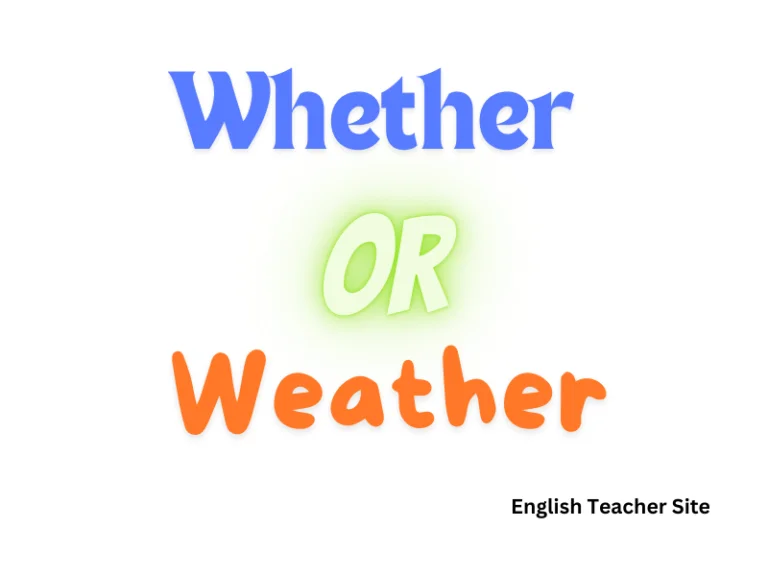
Whether vs Weather: Understanding the Difference and Usage in English
Homophones like “weather” and “whether” often cause confusion due to their similar pronunciation, yet they carry entirely different meanings. “Weather” can be both a noun and a verb pertaining to the state of the atmosphere, including such conditions as temperature, wind, rain, or sunshine. On the other hand, “whether” is a conjunction used to introduce…
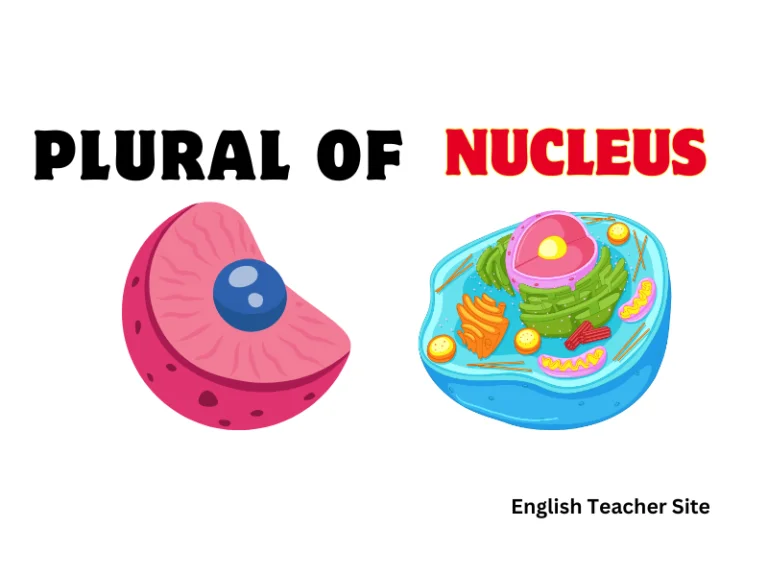
What’s the Plural of Nucleus? – Understanding Singular and Plural Forms in Science
The pluralization of words from Latin can be subject to rules different from those for words of Anglo-Saxon origin. For “nucleus,” the classical plural form is “nuclei,” aligning with other Latin plurals ending in “-i.” However, the adaptation of Latin words into English has also led to the formation of an alternative plural form “nucleuses,”…
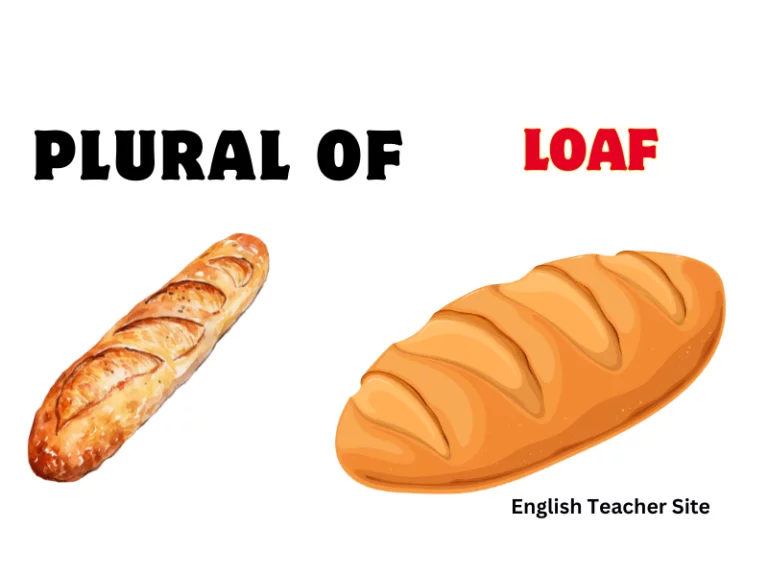
What’s the Plural of Loaf: Understanding Singular and Plural Nouns
The plural of “loaf” is “loaves.” This change from -f to -ves in the plural form is an example of an irregular pattern that occurs with some other nouns ending in -f or -fe as well. It is part of what can make English a challenging language to learn. When using “loaf” in sentences, it’s…
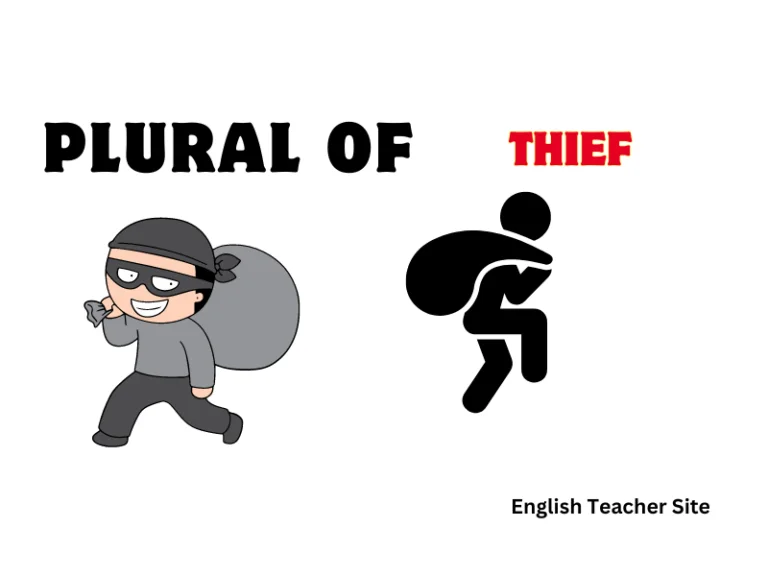
What’s the Plural of Thief: Understanding Singular and Plural Nouns
The English language is full of curiosities, particularly when it comes to forming plurals. One such curiosity involves the pluralization of the word “thief.” While the singular form is straightforward, the transformation of this noun into its plural form may pose a challenge for learners. The word “thief” belongs to a category of English nouns…
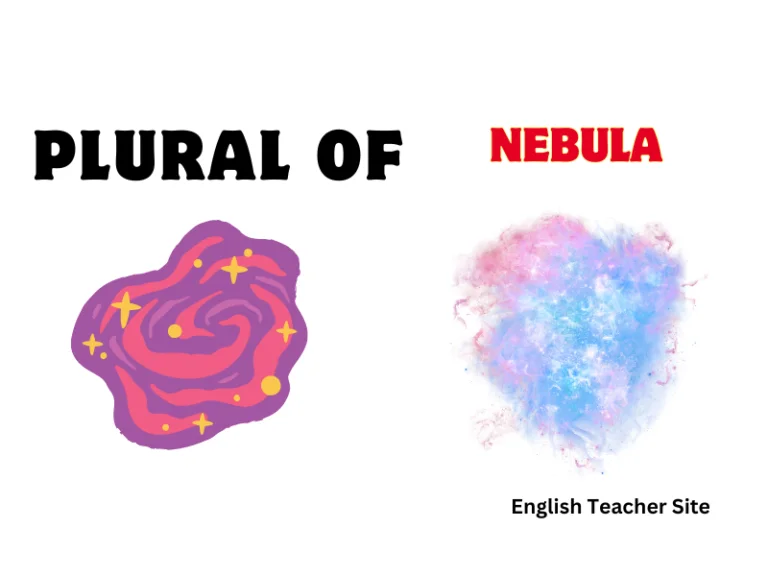
What’s the Plural of Nebula: Unveiling the Correct Term
When it comes to the language of astronomy and the cosmos, certain terms evoke a sense of wonder and curiosity. The word “nebula” is one of those terms—a single-word gateway to discussions about the vast, swirling clouds of gas and dust in space, which are often the birthing grounds of stars. However, even the most…
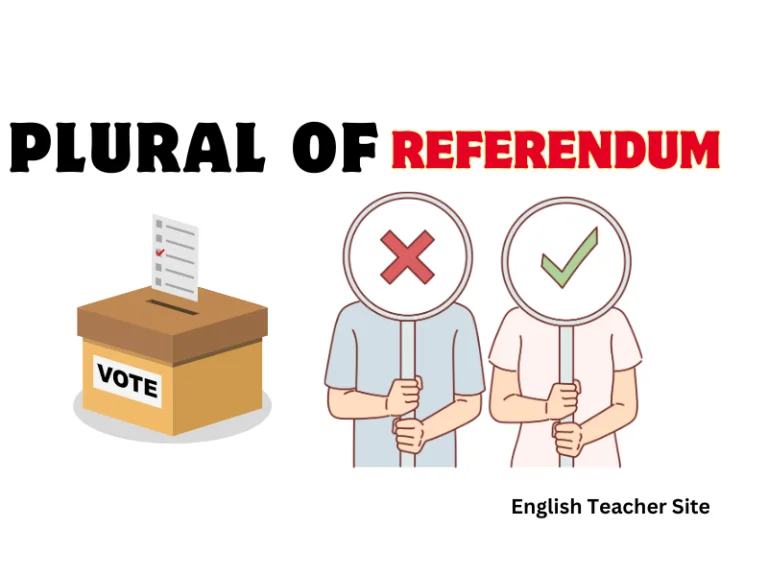
What’s the Plural of Referendum: Understanding Language Nuances
The term ‘referendum’ is frequently encountered in political contexts, denoting a process where voters are invited to cast their ballots on a particular proposal or issue. This Latin-derived noun has sparked discussions concerning its proper plural form—should it be ‘referendums’ following English conventions or ‘referenda’ retaining its Latin root? This question often arises because English…
Leave a Reply Cancel reply
You must be logged in to post a comment.

IMAGES
COMMENTS
The plural of "hypothesis" is "hypotheses." Scientists base scientific hypotheses on previous observations that cannot be explained with the available scientific theories. Experimenters may test and reject several hypotheses before solving a problem.
noun. hy· poth· e· sis hī-ˈpä-thə-səs. plural hypotheses hī-ˈpä-thə-ˌsēz. Synonyms of hypothesis. 1. a. : an assumption or concession made for the sake of argument. b. : an interpretation of a practical situation or condition taken as the ground for action.
Hypotheses is the plural word of “hypothesis” and refers to multiple explanations or assumptions that are to be tested in a scientific way. Hypothesis vs. hypotheses sentence examples. The hypothesis about sunlight and its effects on plant growth turned out to be true.
The plural form of hypothesis is hypotheses. Find more words! The study focuses on math and language arts, and the results strongly support these hypotheses. His distaste for hypotheses is the natural reaction of a man in possession of a far superior instrument for winnowing truth from error.
noun [ C ] us / hɑɪˈpɑθ·ə·sɪs / plural hypotheses us / hɑɪˈpɑθ·əˌsiz /. Add to word list. science. an idea or explanation for something that is based on known facts but has not yet been proven: Several hypotheses for global warming have been suggested.
plural of hypothesis. (Definition of hypotheses from the Cambridge Advanced Learner's Dictionary & Thesaurus © Cambridge University Press) Examples of hypotheses. hypotheses. It is clear that some quite abstract robot representations have usefully tested some quite specific biological hypotheses. From the Cambridge English Corpus.
The plural form of the hypothesis is hypotheses. This is the only way in the English language to make hypothesis plural. Because of the Greek origin, the rule of making a noun that ends in “is” to change it to “es.”
A hypothesis is a single proposed explanation for a phenomenon, based on limited evidence. Hypotheses are the plural form, indicating multiple such explanations.
The plural of hypothesis is hypotheses. Definition of hypothesis: A supposition or assumption based on limited evidence which has yet to be proven or disproven.
In the most straightforward terms, the plural of “hypothesis” is “hypotheses.” This transformation follows a specific pattern seen in words that end in “-is,” with the “-is” changing to “-es” to form the plural.